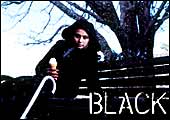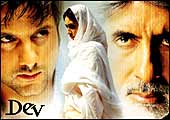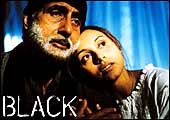 |
Anshumaan Swami
CEO, Applause Entertainment
"Film business is like quicksand
and even after you have done 20 films, you cannot predict
what will happen to the next one" |
 |
When
Anshumaan Swami got down to marketing Black, he didn't think of
it as a movie. Instead, he looked upon the Amitabh Bachchan and
Rani Mukherjee-starrer as a pricey Bentley or a snazzy Louis Vuitton.
In an industry where 800 movies roll off production studios every
year, why would anybody risk pussyfooting with marketing? Because
the movie, about a deaf-dumb-blind girl and her ageing, eccentric
teacher who is hell bent on making her self-reliant, wasn't meant
to be a mass-market fare. In fact, it strayed so far from the
typical Bollywood formula that it had all the chances of bombing
on the box office. There were no action scenes, colourful and
hip-gyrating songs, or even pretty faces. On the contrary, heroine
Mukherjee was made to look plainer, Bachchan much older and eccentric
than he actually is, and the director demanded a level of sensitivity
not usually expected of viewers of Hindi movies. Says Swami, CEO
of Applause Entertainment, an Aditya Birla Group company that
produced the movie: "My core audience for the film is that
which understands what Amitabh Bachchan says in the movie: Mujhe
vishwas aur samay ke sivai aur kuch nahi chahiye (I don't need
anything other than time and trust)."
Convinced that the usual marketing strategy
won't work, Applause decided to go in for word-of-mouth marketing
and restrict the initial release to multiplexes, which meant that
only audiences in metro cities, and that too from sec A and B
categories, would be watching it. For a movie that had cost Rs
21 crore to make, it was a risky marketing plan to adopt, but,
fortunately for Swami, it seems to have paid off. Six weeks into
the release, Black has fetched around Rs 15 crore in theatre ticket
sales and another Rs 4.5 crore from satellite TV rights (film
producers sell television rights to channels). Says Komal Nahta,
a Bollywood tracker: "In multiplexes and in big cities like
Mumbai and Delhi, the film has done exceptionally well and is
a fair grosser."
Movie Management
Two years ago, when the Aditya Birla Group's
young Chairman, Kumar Mangalam Birla, roped in Swami to launch
Applause, he was wading into treacherous waters. Unorganised and
chaotic, Bollywood had steadily resisted all attempts at "corporatisation"
of movie making. Among the famous failures is ABCL (of Amitabh
Bachchan that's now making a comeback). Indeed, Applause's first
movie, Dev (again a Bachchan starrer) sank without a trace. Recalls
Swami: "The fear set in when local newspapers said that yet
another corporate bites the dust." Therefore, when he was
first approached to bankroll Black, he took six long months to
make up his mind, never mind that it boasted of a reputed director
like Sanjay Leela Bhansali.
 |
| Movie business is likely to be Rs 14,300
crore-big by 2010. But producers will have to build a portfolio
of cost-effective films across different genres, languages
and market segments |
 |
Yet, the fact remains that movie making is
a tricky business, where nine out of every 10 movies produced
fail to generate profits. Swami, an advertising professional who
also managed Grasim Mr. India for the Aditya Birla Group before
joining Applause, knows that only too well. Which is why even
before he signed for the first movie, he tried his hand at movie
distribution. In 2003, Applause bought the distribution rights
of a British-made movie, Anita and Me. The idea was to tell Bollywood
that Applause was in business. And when it did come to producing
a movie, the company chose a low-budget Bengali film, Tepantorer
Mathe, meant for the film festival circuit, followed by another
low-budget movie, but in Telugu, called Tapana. Says Swami: "We
lost money on the productions, but they gave us insights into
movie making in India."
Will Applause deliver another Black this
year or even the next? Nobody can tell, least of all Swami. That's
a reason why Applause does more than just make movies. It has
a fledgling visual effects and animation division that did some
work for The Lord of the Rings III: The Return of the King, but
its "bread and butter" business is television software.
Starting with Bollywood Tonight (a half-hour show on Zee UK and
us), Applause now has three different shows on Zee and Star TV.
Predictably, this is not a market without its share of competition.
Successful content houses like Balaji Telefilms and UTV churn
out 32 and 20 hours of programming every week, respectively, compared
to Applause's 6.5 hours. Also, the newcomer's focus has been on
fiction. There are plans of producing non-fiction shows too. Generally,
large canvas fiction shows are more expensive to produce, but
offer higher returns than non-fiction ones. Says Swami, whose
company is yet to see a rupee in net profits: "It's a slow
process and takes 10 months to a year."
THE APPLAUSE EFFECT
Applause Entertainment has a wide
range of offerings spanning television, movies and animation. |
Television
For TV, Applause believes in TRP-driven quality content. It
has a bouquet of diverse programmes in English, Hindi and
other regional languages. Programmes include Bollywood Tonight
(aired on Zee in the UK and US), Kyu Ki Ye Hai Hasya Kavi
Mukabla on Zee Smile and Chi and Me on Zee TV.
Movies
Like every movie producer, Applause claims to produce viable
projects with reliable actors and skilled technicians, and
also asserts that it infuses the otherwise ad-hoc and haphazard
filmmaking process with discipline and professionalism.
With Black doing well on the box office, Applause's claims
sound more credible.
Animation
Animation is not on the priority list at the moment, but
Applause's Visual Effects and Animation cell did work on
a portion of the global blockbuster The Lord of the Rings
III: The Return of the King.
|
But, then, Swami is in no rush. The long-term
prospects for the entertainment industry look good. According
to a CII-KPMG survey-Indian Entertainment Industry: Focus 2010-television
is the most important component, contributing more than 60 per
cent of the revenues. Better still, it is expected to drive the
industry's growth well into the digital era, with the advent of
new delivery systems such as direct to home (DTH) and interactive
TV. According to the survey, the TV software market is currently
estimated at Rs 13,900 crore and expected to touch Rs 37,100 crore
by 2010. Says Rajesh Jain, Executive Director, KPMG: "There
are large corporate houses looking at this segment because this
is going to be a big driver of the entertainment industry."
Films, understandably, will continue to be
the ones that bring glory, if not top dollar. After all, it's
only half as big as the TV software market and will only be Rs
14,300-crore big by 2010, according to estimates. No doubt because
of the high risk, KPMG consultants think that producers will need
to adopt a very different strategy in the future. Instead of making
one or two big-budget movies, they will have to build a portfolio
of cost-effective films in a year. They will also need to look
at different genres, languages and market segments to spread their
risks better.
Swami couldn't agree more. "The movie
business is like quicksand and even after you have done 20 films,
you cannot predict what will happen to the next one," he
says. Not even the most successful producer in Bollywood is allowed
to forget that cardinal rule.
|







